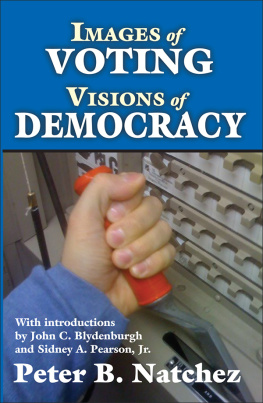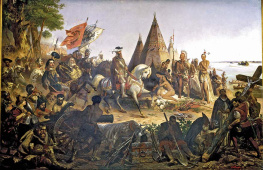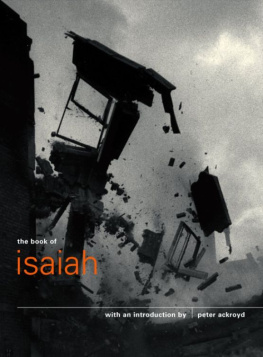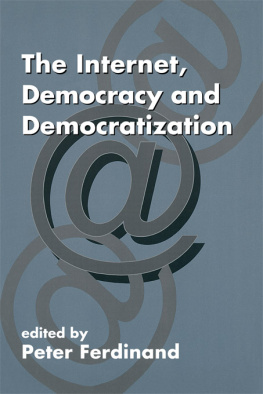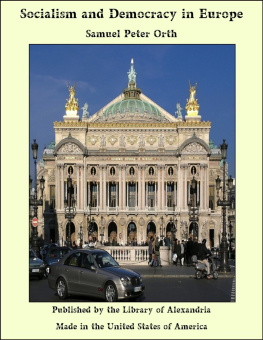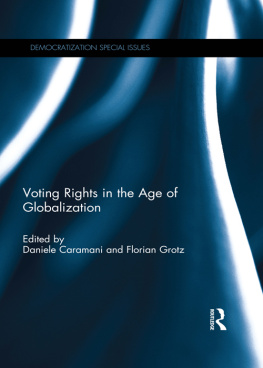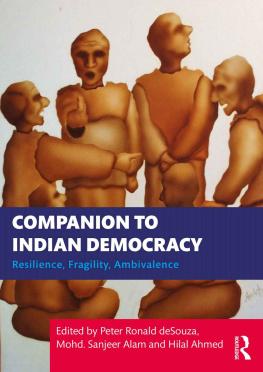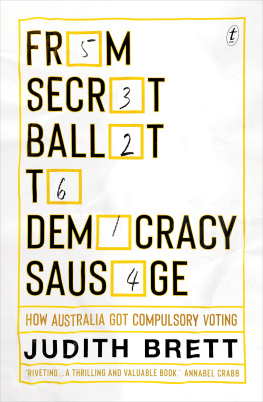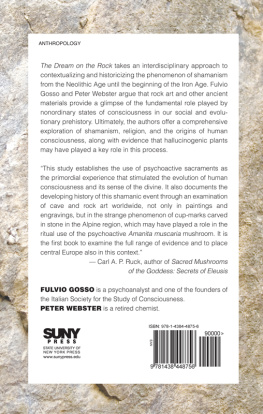IMAGES of VOTING VISIONS of DEMOCRACY
IMAGES of VOTING VISIONS of DEMOCRACY
Peter B. Natchez
With introduction by John C. Blydenburgh and Sidney A. Pearson, Jr.
Originally published in 1985 by Basic Books
Published 2012 by Transaction Publishers
Published 2017 by Routledge
2 Park Square, Milton Park, Abingdon, Oxon 0X14 4RN
711 Third Avenue, New York, NY 10017, USA
Routledge is an imprint of the Taylor & Francis Group, an informa business
New material this edition copyright 2012 by Taylor & Francis
All rights reserved. No part of this book may be reprinted or reproduced or utilised in any form or by any electronic, mechanical, or other means, now known or hereafter invented, including photocopying and recording, or in any information storage or retrieval system, without permission in writing from the publishers.
Notice:
Product or corporate names may be trademarks or registered trademarks, and are used only for identification and explanation without intent to infringe.
Library of Congress Catalog Number: 2011021574
ISBN 13:978-1-4128-4292-1 (pbk)
The following publishers have generously given permission to use extended quotations from copyrighted works: From The Authoritarian Personality, by T.W. Adorno et al. Copyright 1950 by The American Jewish Committee. Reprinted by permission of Harper & Row, Publishers, Inc. From The Peoples Choice: How the Voter Makes Up His Mind in a Presidential Campaign (2nd ed.), by Paul F. Lazarsfeld, Bernard Berelson, and Hazel Gaudet. Copyright 1948 by Columbia University Press. Reprinted by permission. From Voting, by Bernard Berelson, Paul F. Lazarsfeld, and William McPhee. Copyright 1954 by The University of Chicago Press. Reprinted by permission. From Continuity and Change in American Politics: Parties and Issues in the 1968 Election, by Philip E. Converse et al. Paper presented to the American Political Science Association, New York, September 1969, and subsequently published in the American Political Science Review (December 1969): 10951101, with minor revision. Reprinted by permission of Philip E. Converse and the American Political Science Association. From Images of Voting: The Social Psychologist, by Peter B. Natchez, in Public Policy 18(4):53388. Copyright 1970 by Harvard University Press. Reprinted by permission of John Wiley & Sons, Inc.
Library of Congress Cataloging-in-Publication Data
Natchez, Peter B., 1941-1981.
Images of voting/visions of democracy / Peter B. Natchez ; with introductions by John C. Blydenburgh and Sidney A. Pearson, Jr.
p. cm.
Originally published: New York : Basic Books, c1985.
ISBN 978-1-4128-4292-1
1. Voting-United States. 2. Voting research-United States. 3. Democracy. I. Title.
JK1967.N28 2011
324.973dc23
2011021574
To my son, Jonathan, and to my daughter, Sarah
In the hope that you each
will trust, and love, and create
I love that the Lord should hear
My voice and my supplications.
Because He hath inclined His ear unto me,
Therefore will I call upon Him all my days.
The cords of death compassed me,
And the straits of the nether-world
got hold upon me;
I found trouble and sorrow.
But I called upon the name of the Lord:
I beseech Thee, O Lord, deliver my soul.
Gracious is the Lord, and righteous;
Yea, our God is compassionate.
The Lord preserveth the simple;
I was brought low, and He saved me.
Return, O my soul, unto thy rest;
For the Lord hath dealt bountifully with thee.
For Thou hast delivered my soul from death,
Mine eyes from tears,
And my feet from stumbling.
I shall walk before the Lord
In the lands of the living.
I trusted even when I spoke:
I am greatly afflicted.
I said in my haste:
All men are liars.
How can I repay unto the Lord
All His bountiful dealings toward me?
I will lift up the cup of salvation,
And call upon the name of the Lord.
My vows will I pay unto the Lord,
Yea, in the presence of all His people.
Psalm 116
CONTENTS
CHAPTER 1
Democracy, Elections, and the Voting Studies
PART I
THE VOTER AND THE VOTING STUDIES
CHAPTER 2
Social Politics
CHAPTER 3
Problems in American Politics
CHAPTER 4
The Psychological Bases of Democracy
CHAPTER 5
The Civic Culture and Its Discontents
PART II
ISSUES IN ELECTORAL POLITICS
CHAPTER 6
Party Identification and Candidate Images
CHAPTER 7
The Problem of Voter Rationality
CHAPTER 8
The Restoration of Theory
ACKNOWLEDGMENTS
Peter Natchez loved life, he loved ideas, and he loved politics. Although his death from cancer in August 1981 robbed him of the opportunity to complete his manuscript in the way he wished, his spirit and passion, his concern and insight, are reflected in these pages.
The ideas that are elaborated in this book were outlined, in the main, more than a decade ago. As Peter once wrote, these ideas would have gone unwritten indefinitely were it not for the encouragement, criticism, and outright impatience of friends, colleagues, and institutions. In the many drafts of the manuscript that he worked on in his last years, he never finalized a list of acknowledgments, although he commented often on the help he wanted to recognize. I take the liberty, therefore, of expressing publically what I know to have been his deeply-felt gratitude to those friends and colleagues who he felt enriched both his scholarship and his life.
Peters acknowledgments surely would have begun with his gifted teacher and steadfast friend, Michael O. Sawyer. As an undergraduate at Syracuse University, Peter felt fortunate to have been able to take courses from Michael O. Sawyer, and his fascination with the political process and democracy was born. His good fortune in working with gifted scholars who generously contributed their time continued at Harvard with Seymour Martin Lipset and H. Douglas Price, both of whom acted as his thesis advisors. Their supervision of his dissertation project encouraged the germination of many of the ideas presented in this volume. Peter commented often on how much he benefitted from working with these two men, before whose prodigious knowledge of American history and politics he stood in awe. V. O. Key, Jr., was another scholar to whom Peter felt deeply indebted. Although never actually his student, Peter felt that Key had been very much his teacher.
Many special friends and colleagues in graduate school and at his teaching institutions also contributed to Peters intellectual enrichment and scholarly growth. Chip Bupp, Gary Orren, and Bill Schneider were a very special group of friends. The years of Socratic dialogue amongst them over issues of voting behavior and the electoral process were among Peters fondest memories. With Bill Schneider, in particular, whose love of politics he shared, Peter felt a special bond of creative inspiration and deep friendship. From his colleagues at BrandeisMarty Levin, Ruth Morgenthau, and, most especially, George Armstrong KellyPeter received the triple gift of intellectual stimulation, personal kindness, and warm support. But it was at Clark University that Peter felt truly at home. His colleagues in the Department of Government and International Relations, his students, and the institution itself all provided him with an environment of intellectual vitality, friendship, and ease within which he could thrive. The warm and spirited colleagueship of John Blydenburgh, Cynthia Enloe, Sharon Krefetz, Charlie Coleman, and Morris Cohen meant more to Peter than perhaps they will ever know. Clark was for Peter a very special place.



